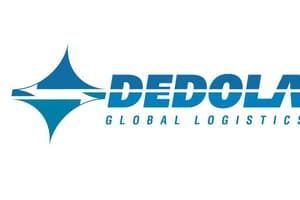Podcast
Questions and Answers
What is the purpose of a packing list in freight forwarding?
What is the purpose of a packing list in freight forwarding?
- To support an insurance claim in case of loss or damage (correct)
- To serve as a detailed invoice for the buyer
- To declare the origin of the goods
- To provide identification for the shipper
What is the difference between a generic certificate of origin and a preferential certificate of origin?
What is the difference between a generic certificate of origin and a preferential certificate of origin?
- A generic certificate of origin is a declaration by the exporter that goods in an export shipment are wholly obtained, produced, manufactured, or processed in a particular country while a preferential certificate of origin is a declaration by the importer
- A generic certificate of origin is for eligible shipments while a preferential certificate of origin is for shipments not eligible for duty reductions or exemptions (correct)
- A generic certificate of origin is required for all shipments while a preferential certificate of origin is optional
- A generic certificate of origin is issued by the CBSA while a preferential certificate of origin is issued by the freight forwarder
What is the most advantageous method of payment for importers?
What is the most advantageous method of payment for importers?
- Documentary credit
- Advance payment
- Open account (correct)
- Documentary collection
Flashcards
Packing List
Packing List
Detailed list of contents in each shipping package, aiding unloading, identification, and inventory.
Certificate of Origin
Certificate of Origin
Confirms goods originate from a specific country.
Advance Payment
Advance Payment
Payment before shipment, protecting exporters from credit and country risks.
Study Notes
Essentials of Freight Forwarding: Documentation, Import/Export Procedures, and International Payments
- There are three types of documentation in freight forwarding: transportation documentation (e.g. bill of lading, air waybill), commercial documentation (e.g. commercial invoices, packing list, certificate of origin), and financial documentation (e.g. letter of credit, bill of exchange).
- Accurate documentation is important to satisfy security and conformity requirements, facilitate customs clearance, prevent delays in payment and storage, and prevent disputes between parties.
- Commercial invoices are accounting documents between buyers and sellers, support customs declaration, and are usually prepared by exporters with assistance from freight forwarders.
- Pro forma invoices are estimated invoices issued in advance for a shipment.
- The packing list is a detailed itemized list of articles in each shipping package used for unloading, identification, and inventory management. It is prepared and signed by the shipper, used in case of customs inspection, and supports an insurance claim in case of loss or damage.
- The certificate of origin is a declaration by the exporter that goods in an export shipment are wholly obtained, produced, manufactured, or processed in a particular country. There are two main types: generic (for shipments not eligible for duty reductions or exemptions) and preferential (for eligible shipments).
- Export permits are issued for items on the Export Control List, and the list of countries in the Area Control List changes. General export permits allow for the export of certain specified goods without submitting an application.
- Import communications and procedures require freight forwarders to educate customers on CBSA requirements and customs procedures, communicate with customers and CBSA, and be proficient in operational processes regarding the customer and the freight.
- Additional requirements for shipping to Mexico include an export declaration, ISPM 15-compliant wood packaging materials, and paying value-added tax (IVA) on imports.
- International payments involve various risks, including credit risk, country risk, foreign exchange risk, dispute risk, and transit risk.
- Methods of settlement include advance payment, open account, documentary collection, and documentary credit.
- Open account is the most advantageous method of payment for importers, but cannot be used under certain circumstances beyond the control of the exporter and importer.
- Advance payments are advantageous to the exporter and used when the importer's credit is doubtful or there is an unstable political or economic environment in the country of destination.
Studying That Suits You
Use AI to generate personalized quizzes and flashcards to suit your learning preferences.




